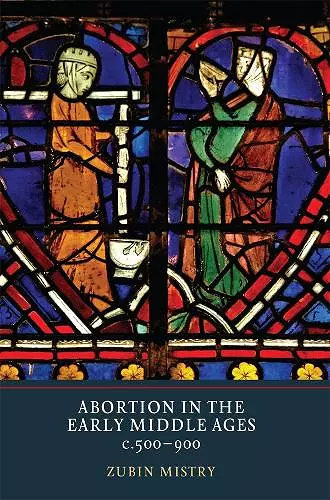Abortion in the Early Middle Ages, c.500-900
Format:Paperback
Publisher:York Medieval Press
Published:19th May '17
Currently unavailable, and unfortunately no date known when it will be back
This paperback is available in another edition too:
- Hardback£95.00(9781903153574)

First full-length study of attitudes to abortion in the early medieval west. When a Spanish monk struggled to find the right words to convey his unjust expulsion from a monastery in a desperate petition to a sixth-century king, he likened himself to an aborted fetus. Centuries later, a ninth-century queenfound herself accused of abortion in an altogether more fleshly sense. Abortion haunts the written record across the early middle ages. Yet, the centuries after the fall of Rome remain very much the "dark ages" in the broader history of abortion. This book, the first to treat the subject in this period, tells the story of how individuals and communities, ecclesiastical and secular authorities, construed abortion as a social and moral problem across anumber of post-Roman societies, including Visigothic Spain, Merovingian Gaul, early Ireland, Anglo-Saxon England and the Carolingian empire. It argues early medieval authors and readers actively deliberated on abortion and a cluster of related questions, and that church tradition on abortion was an evolving practice. It sheds light on the neglected variety of responses to abortion generated by different social and intellectual practices, including church discipline, dispute settlement and strategies of political legitimation, and brings the history of abortion into conversation with key questions about gender, sexuality, Christianization, penance and law. Ranging across abortion miracles in hagiography, polemical letters in which churchmen likened rivals to fetuses flung from the womb of the church and uncomfortable imaginings of resurrected fetuses in theological speculation, this volume also illuminates the complex cultural significance of abortion in early medieval societies. Zubin Mistry is Lecturer in Early Medieval European History at the University of Edinburgh.
Mistry gives a comprehensive and illuminating study on the historical representations of abortion in the early Middle Ages without overly simplifying the range of material and viewpoints which occur. * TOEBI *
Makes a valuable contribution to the field that offers some important correctives....[Mistry's] study should be warmly welcomed by all interested in the medieval European history of abortion. * EARLY MEDIEVAL EUROPE *
A detailed and even-handed treatment of difficult sources that offers a valuable correction to previous scholarship and a new window into early medieval religious thought. * ENGLISH HISTORICAL REVIEW *
Mistry's analysis is characterized by careful and adroit readings of an unusually wide variety of sources. . . . This book is both learned and thought-provoking. * JOURNAL OF INTERDISCIPLINARY HISTORY *
[A] brilliant cultural history of abortion. * FRANCIA *
Mistry's relentless focus on early medieval sources reveals their varied attitudes to abortion, complicating the picture provided by such scholars as John Noonan, who wanted to see Catholic teaching as unchanging on the matter. His book will therefore prove valuable to early medievalists interested in marriage, sexuality, and religion. * H-NET *
In this learned and wide-ranging study, historian Mistry examines the institutions and communities that construed abortion as a social problem c. 500-900. Recommended. * CHOICE *
ISBN: 9781903153758
Dimensions: unknown
Weight: 531g
356 pages